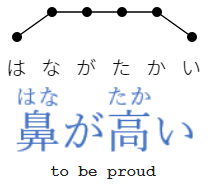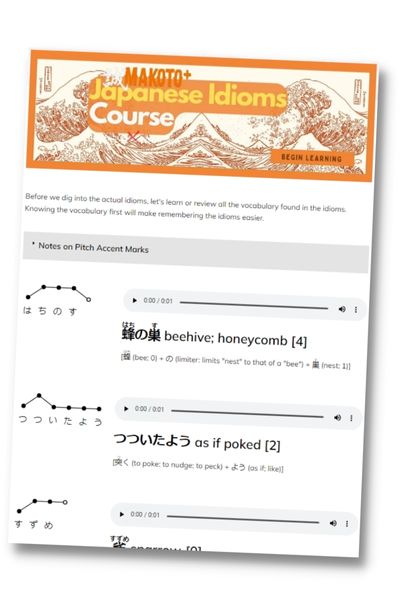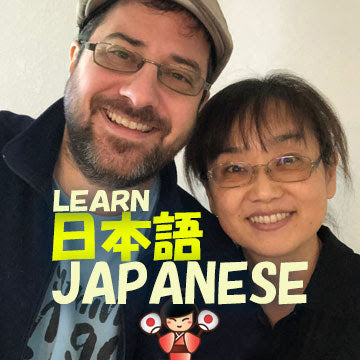Let's look at a fun Japanese idiom today. Literally, this is "tall nose." But what does it really mean? Read below to find out.
We are about to release the next two modules for the brand new Makoto+ Japanese Idioms course. This update will unlock another 59 important and fun Japanese idioms (our goal for the complete course is about 300 idioms). This time, the idioms are all related to the face.
More on that below, but first, let's learn this idiom.
When someone is proud of some achievement, they are said to have a "tall nose."
This came about by one's posture. When people are proud, they walk around with their heads up and their noses high in the air.
Another potential origin for this idiom is 天狗 (Tengu--click here for our Learn Japanese through Yokai digital bundle).
The tengu are yokai that live in the mountains and are well known for their long noses. It is said the art of ninjutsu came from the Tengu. They are proud, knowledgeable, and love to boast to people about their knowledge.
A secondary meaning is to literally "have a tall/big nose." Sometimes, Japanese will say foreigners have a "tall/big nose." This is a compliment since many Japanese believe their noses are too small.
This idiom has mainly a positive nuance, as you'll see in the example sentence below, but can be used to describe someone negatively.
As you can see from the pitch accent diagram above, the idiom starts low, raises slightly, and stays there until falling on the last mora. The か (second to last mora) may have a slightly higher pitch than the others since it is just before the drop.
You can hear Yumi recite this idiom in a video we made (with waaaaay too much background music) almost ten years ago. Click here for the video on 鼻が高い.
The course, of course (haha... sorry), has new recordings, including a slowed-down version.
Vocabulary with Pitch Accents (learn more about pitch accents here)
鼻(はな) nose [0]
[This pitch accent means it starts low and goes up slightly (very slightly) and stays there even when a particle follows (the white circle indicates that). So, the が in the phrase stays high.]
が (marks what is "high")
[The が marks what the adjective modifies]
高い【たかい】 high; tall [2]
[When in the phrase, the た is high, but as a standalone word, it starts low, raises slightly, and then returns to the base pitch with the い. There is no particle after 高い, but if there were, it would also be low (the white circle).]
SENTENCE: Can you read and translate the sentence below? See below for vocabulary help and the bottom of this email for our translation.
VOCABULARY:
- 息子 son
- 東大 Tokyo University (short for 東京大学(とうきょうだいがく)) [a prestigious university in Tokyo]
- に (entered) to (Tokyo University)
- はいった entered in; accepted into [past of はいる (to enter; to be accepted)]
- ので because
- お父さん (his) father [お (honorific-prefix) + 父 (father) + さん (polite-suffix)]
- 鼻が高い is proud [鼻(はな) (nose) + が (marks what is tall) + 高(たか)い (tall)]
Can you translate the sentence? See the bottom of this email for a potential translation.
The plan for this week is release not one but two new modules to the Idioms course. These will cover face-related idioms.
If you haven't signed up for the course, there are three ways to gain access:
- Non-members can purchase lifetime access to this course for $29. Click here.
- Makoto+ Samurai members have a coupon to make this course only $10. Click here for your member's area.
- Makoto+ Shogun and Lifetime members have unlimited and free access to this and all courses. Click here to sign up.
We'll break down all the vocabulary, practice those words, put them back together to form the idioms, and then practice the idioms in context until you internalize them.
This is done with online lessons, audio files, Anki flashcard decks, printable PDFs, and interactive quizzes. You also get our eBooks on idioms (the first is available now, but we will add the other two soon).
In other words, this course should be a massive help for your vocabulary and for sounding natural in Japanese.
If you want to get started with the already released Animal idioms module, please become a Shogun ($10 a month) or Lifetime member (still only $249) now.
As soon as the new modules are released, you'll gain instant access to those too.
Samurai members ($3 a month) don't have free access to our courses (except the hiragana one), but they do have a coupon in the members area to buy a lifetime license to any course for only $10 each.
Become a Makoto+ Member or learn about our lifetime offer!
Or become a Patreon supporter. If you are $10 or more a month supporter, you'll get free access to the new course (and all our courses!)
Thank you,
Clay & Yumi
P.S. A possible translation for the above sentence is, "The father was extremely proud of his son entering Tokyo University."











